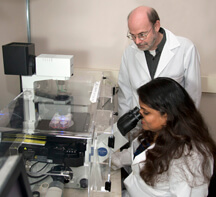Decoding dengue and West Nile
February 6, 2014
 |
|
Purdue biological sciences professor Richard Kuhn and research associate Joyce Jose view live images of Dengue virus-infected cells using a fluorescent microscope in the Biosafety Level 2 Laboratory (BSL-2) at Hockmeyer Hall of Structural Biology. (Purdue University photo/Mark Simons) |
WEST LAFAYETTE, Ind. — A team of scientists from Purdue University and the University of Michigan have captured the structure of a protein that could lead to new treatments for dengue and West Nile viruses.
Researchers have pursued this protein for years because both its role in replication and its unique release into the bloodstream mark it as a target for treatment of infection, said Richard Kuhn, professor and department head of biological sciences and the Gerald and Edna Mann Director of the Bindley Bioscience Center at Purdue.
"Having the structure of NS1 is a huge advance in understanding, and using, the protein to our advantage," said Kuhn, who led the Purdue team involved in the work. "Understanding how the protein is designed provides an easier pathway to understanding its roles in the virus life cycle. We now know which portions of the protein to target in drug development to shut it down and stop the progression of infection."
A paper detailing the research was published in the journal Science and is available online. In addition to Kuhn, Purdue research associate Joyce Jose is a co-author.
 |
|
Richard Kuhn |

